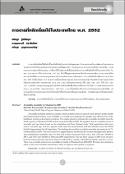บทคัดย่อ
การตายที่หลีกเลี่ยงได้เป็นตัวชี้วัดหนึ่งที่สำคัญในการประเมินคุณภาพการรักษาพยาบาลหรือการพัฒนานโยบายสุขภาพของประชากรที่ใช้อย่างแพร่หลายในกลุ่มประเทศที่พัฒนาแล้ว โดยแสดงการตายจากสาเหตุที่ไม่ควรจะเกิดขึ้น หากมีมาตรการทางสุขภาพที่เหมาะสม การศึกษานี้มีวัตถุประสงค์เพื่อประเมินอัตราการตายที่หลีกเลี่ยงได้ในประชากรไทย ใน พ.ศ. 2552 และแนวโน้มระหว่าง พ.ศ. 2547-2552 โดยใช้ข้อมูลการตายจากสำนักบริหารการทะเบียน กระทรวงมหาดไทย คำนวณโดยใช้อัตราการตายมาตรฐานขององค์การอนามัยโลก ผลการศึกษาพบว่า การตายที่หลีกเลี่ยงได้ของประชากรไทย พ.ศ. 2552 คิดเป็นร้อยละ 36.7 ของการตายทั้งหมดในทุกกลุ่มอายุ อัตราการตายมาตรฐานในเพศชายโดยรวมสูงกว่าเพศหญิงประมาณสองเท่า และลดลงจาก 332.6 และ 178.8 ต่อประชากรแสนคน เป็น 288.1 และ 149.7 ในปี 2547 และ 2552 ตามลำดับ สาเหตุการตายสูงสุดสามลำดับแรกคือโรคติดเชื้อชนิดแบคทีเรียและโปรโตซัว การฆ่าตัวตายและทำร้ายตนเอง และมะเร็งตับ โดยสรุปช่วงพ.ศ. 2547-2552 การตายที่หลีกเลี่ยงได้ของประเทศไทยลดลงอย่างเห็นได้ชัด แต่ความถูกต้องของการประเมินการตายที่หลีกเลี่ยงได้ขึ้นกับคุณภาพข้อมูลจากมรณะบัตร การพัฒนาคุณภาพข้อมูลมรณะบัตรจึงมีความสำคัญ
บทคัดย่อ
Avoidable mortality, defined as deaths which should not have occurred when effective public health
and medical interventions were available, is a widely-used indicator for quality and effectiveness of the
healthcare system in developed countries. This study aimed to estimate the avoidable mortality from the
death registry in Thailand in 2009 and its trend from 2004 to 2009. We applied a list of avoidable causes of
mortality and age limits based on the Australian and New Zealand study. Vital registration data were
used to calculate age- and sex- specific death rates and standardized with the reference from the World
Health Organization World Population. The findings showed that avoidable mortality amounted to 36.7%
of total deaths in 2009. The rate for men was approximately double that for women throughout the period.
Age-standardized mortality rates for men and women decreased from 332.6, and 178.8 per 100,000 to
288.1, and 149.7 per 100,000 in 2004 and 2009, respectively. The top three causes in 2009 were invasive
bacterial and protozoan infectious diseases, followed by suicide, self-inflicted injuries and liver cancer.
There was a notable reduction in avoidable mortality in Thailand from 2004-2009. But since the estimation
relies on the cause-of-death information, effort to improve data quality is required.


